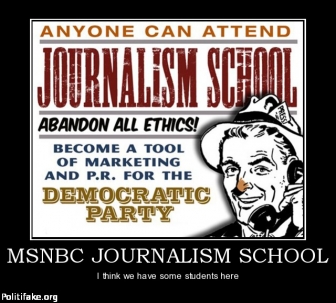. . . and it does not matter how often they publish, where or how they publish, what they primarily publish . . . or what they are wearing when they publish. The word of art here is publish, and our call is for equal treatment of those who publish reports of a political nature at any time and the privileges and protections that pertain.
 A Senate bill proposed by Sen. Dianne Feinstein, which purports to define who is a journalist and deserving of reporter “shield” protections afforded by the government and defined in the bill, passed out of the Senate Judiciary Committee. The bill runs afoul of the Constitution.
A Senate bill proposed by Sen. Dianne Feinstein, which purports to define who is a journalist and deserving of reporter “shield” protections afforded by the government and defined in the bill, passed out of the Senate Judiciary Committee. The bill runs afoul of the Constitution.
Read these links we picked up via Drudge, and other links we added upon further reading, about the Judiciary Committee’s actions. Read as much as you can of the comment sections that are part of each in order to get a feel for what is at stake. From our scan of the comments there is overwhelming opposition.
Ben Shapiro writing at Breitbart.com reports:
Sen. Mike Lee (R-UT) launched into the proposed bill, which he said could “have the effect of excluding certain persons from enjoying the added First Amendment protections the bill would provide.” Sen. Ted Cruz (R-TX) agreed, stating, “Essentially as I understand this amendment, it protects what I would characterize as the ‘corporate media.’…But it leaves out citizen bloggers….I don’t think any protection should treat citizen bloggers who are meeting the underlying test of being primarily engaged in gathering news to report it I don’t think they should be excluded because they don’t happen to work for a media corporation.” He continued:
It strikes me that we are on dangerous territory if we are drawing distinctions that are treating some engaged in the process of reporting and journalism better than others. If we are advantaging those who happen to receive a paycheck from a corporate media entity over those who happen to be citizens….I for one would have deep troubles with legislation from Congress saying ‘we will grant special privileges if you happen to work for a corporate media interest’….It seems to me the First Amendment protects the activity, not the employment status of the person engaging in it.
At a minimum we agree with Lee’s and Cruz’s stated concerns.
Twitchy.com staff had the following to say:
Sen. Dianne Feinstein, D.-Calif., thinks a proposed media shield law should be applied only to “real reporters,” not basement-dwelling, pajama-clad bloggers with no professional credentials . . .
Under the definition proposed by Feinstein, a student working for a tiny college newspaper would get protection, but Matt Drudge, the owner and operator of the most successful news site on the Internet, might not.
As far as we know, the distinction Feinstein is making isn’t mentioned in the First Amendment. But what do we know? We’re just bloggers.
Ed Morrissey writing at Hot Air has an excellent summation of the problems with the bill:
And, of course, it still means that the government gets to define journalists in as narrow a sense as they like for the purposes of applying this shield. Reporters for newspapers and broadcast outlets would certainly be covered, but that certainty ebbs the farther one goes from that core. What about writers at online sites like Hot Air and Huffington Post? Probably covered. RedState and Firedoglake? Well … are they journalists or activists? If the government gets to define it, then probably the latter — and that’s going to be more true for less-commercial online sites. Will writers at those sites feel more or less free to run real reporting based on inside sources? Better yet, will the inside sources want to talk with writers whose shield is very questionable, or to reporters whose shield will be more substantial?
This is basically rent-seeking by the big players in the media market, a sham by the Senate, and an affront to the First Amendment. Any shield law should concern itself with process and not identification. The founders did not include the First Amendment in order to allow the government to decide who gets its protections. If the shield is an extension of the First Amendment, then it applies to everyone involved in journalistic efforts, or no one at all.
Incredibly, Roll Call did not live up to its name in specifying for readers what the roll call vote was . . . specifically which senators voted for it and which ones did not. The vote was 13 to 5 in favor of the bill. According to this collection of articles, including Roll Call, the opposition was Republican, but for various reasons. Some of the opposition was not based on more compelling First Amendment concerns, but for overwrought “national security” concerns. Other Republicans joined in support of the bill.
Reading a New York Times article by Ashley Southall we find that Senator Grassley voted for issuing the bill out of committee. Senator Grassley has been a champ of late in pursuit of many conservative purposes. We are disappointed in his vote. R Mall
